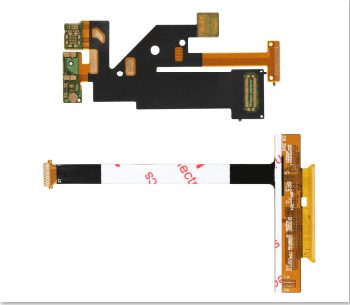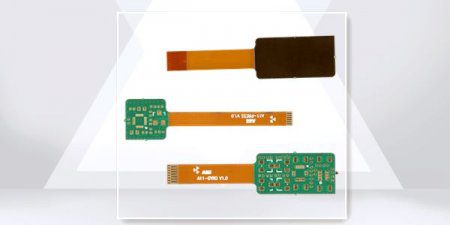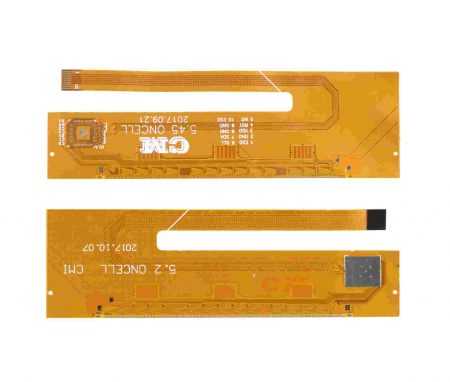- +86-755-23012705
- Building 3, Jinfeng Industrial Park, Fuyong Street, Baoan District, Shenzhen ,China
- [email protected]
Electronic products all use PCB, and the market trend of PCB is almost the vane of the electronics industry. With the development of high-end, miniaturized electronic products such as mobile phones, laptops, and PDAs, the demand for flexible PCB (FPC) is increasing, and PCB manufacturers are accelerating the development of thinner, lighter, and higher-density FPCs.
It has a chemically etched conductive pattern, and the conductive pattern layer on the surface of the flexible insulating substrate is rolled copper foil. The insulation substrate can be polyimide, polyethylene terephthalate, aramid fiber ester and polyvinyl chloride. Single-layer FPCs can be divided into the following four subcategories:
The wire pattern is on an insulating substrate, the wire surface is not covered, and its interconnection is achieved by soldering, fusion soldering or pressure soldering, which is commonly used in early telephones.
Compared to the previous class, only an additional layer of covering is added to the surface of the wire. When covering, the pad needs to be exposed, and it is simple to leave the end area uncovered. It is the most widely used and widely used in single-sided flex PCB, which is used in automotive instruments and electronic instruments.
The connection plate interface can be connected to both the front and back of the wire, and a hole is made in the insulating substrate at the pad, which can be punched, etched or otherwise mechanically made at the desired position of the insulating substrate.

Image 1: Polyimide Stiffener of Flex PCB board
The former class is different in that the surface has a covering layer with access holes that allow it to be terminated on both sides while still maintaining the covering, and is made of two layers of insulation and a layer of metal conductor.
Double-sided FPC has a conductive pattern made by etching on each side of the insulating base film, which increases the routing density per unit area. Metallized vias form conductive pathways by connecting the two sides of the insulating material to meet the design and use functions of flexibility. The overlay film protects the single- and double-sided conductors and indicates where the components are placed. Metallized holes and overlays are optional as required, and this type of FPC is rarely used.
Multilayer FPC is to laminate 3 or more layers of single-sided or double-sided flexible circuits together, and form metallized holes through drilling and electroplating, forming conductive paths between different layers. In this way, there is no need for complex welding processes. Multilayer circuits offer huge functional differences in terms of higher reliability, better thermal conductivity, and easier assembly performance.

Image 2: HDI rigid-flex PCB made by XPCB Ltd
The advantage is that the base film is lightweight and has excellent electrical properties, such as a low dielectric constant. The multi-layer flexible PCB board made of polyimide film as the substrate is about 1/3 lighter than the weight of the rigid epoxy glass cloth multi-layer PCB board, but it loses the excellent flexibility of single-sided and double-sided flexible PCB, and most of these products do not require flexibility. Multilayer FPCs can be further divided into the following types:
This category is made on a flexible insulating substrate, and its finished product is specified as flexible. This construction typically bonds the ends of many single- or double-sided microstrip flexible PCBs together, but the center part is not bonded together at the end, making it highly flexible. For a high degree of flexibility, a thin, suitable coating, such as polyimide, can be used instead of a thicker laminate overlay on the wire layer.
This type is made on a soft insulating substrate, and the end of the finished product can be flexed. This type of multilayer FPC is laminated with a soft insulating material, such as polyimide film, to make a multilayer board, which loses its inherent flexibility after lamination.

Image 3: OEM flexible circuit board
Make Your PCB Dreams a Reality with XPCB Limited
XPCB Limited is your go-to partner for turning your PCB dreams into reality. Our streamlined PCB manufacturing process, combined with quick-turnaround prototyping and turnkey PCBA services, ensures that your projects come to life with ease. Trust in our expertise and dedication to quality as we help you achieve your PCB goals. Join us and experience the difference with XPCB Limited.






XPCB Limited is a premium PCB & PCBA manufacturer based in China.
We specialize in multilayer flexible circuits, rigid-flex PCB, HDI PCB, and Rogers PCB.
Quick-turn PCB prototyping is our specialty. Demanding project is our advantage.
Tel : +86-136-3163-3671
Fax : +86-755-2301 2705
Email : [email protected]
© 2024 - XPCB Limited All Right Reserve
